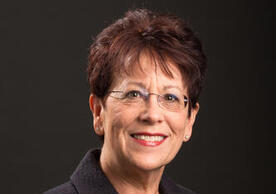
Beatrice Renfield Term Professor of Nursing Dr. Nancy S. Redeker, PhD, RN, FAHA, FAAN recently provided comments to the National Institutes of Health (NIH) on the Advanced Research Projects Agency for Health (ARPA-H), a new entity within NIH proposed by the Biden Administration that would focus on equity, diversity in funding recipients and patient populations, and using research to solve practical problems.
The listening session in which Dr. Redeker provided feedback focused on “Advocates for Research on Minority Health and Health Disparities, and Nursing.”
Dr. Redeker identified multiple barriers to care and explored possible solutions in her remarks.
“Innovative solutions that truly change lives and will improve health are broadly needed, but they need to be broadly accessible,” she said. “For example, digital tools, bio censors, remote monitoring, and data capture are all additive, but individuals who reside in rural areas, or have low incomes, or poor or no or expensive broadband access, or lack personal devices are increasingly left behind.”
Dr. Redeker discussed how ARPA-H could support innovative high-risk proposals, changing the makeup of review panels, and exploring considerations beyond traditional criteria. She also discussed focusing on commercialization potential, dissemination and implementation, the idea of including patient stakeholders in the review process, and embracing industry experts even without a typical NIH bio.
She also advocated for the expansion of telehealth and the need to study how it can be used effectively.
The ARPA-H listening session included representatives from NIH, the White House Office of Science and Technology Policy, the National Alliance for Hispanic Health, and PRIDEnet, among other groups.
Redeker provided comments in her role as Chair of the Council of Advancement for Nursing Science (CANS).
“In the effort to promote better health, we (CANS) enhance communication among nurse scientists and the public to develop, disseminate, and use nursing research. Our mission is better health through nursing science, and our members conduct research across the spectrum from birth to death, and across the trajectory of acute and chronic illness including palliative and end of life care.”
